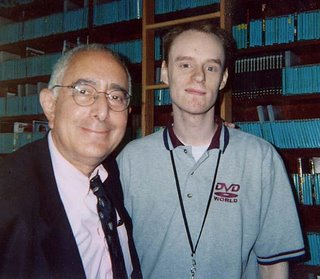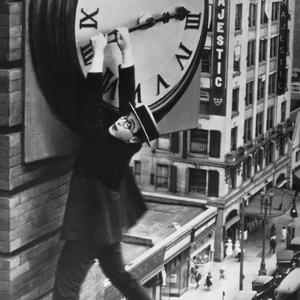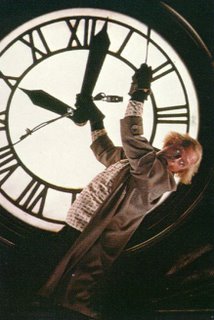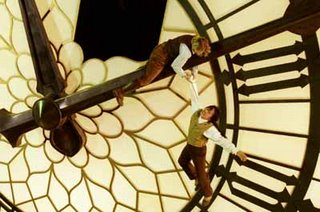

"A toast to my big brother George: The richest man in town."
--Harry Bailey
"I, Jack, the Pumpkin King: That's right! I AM the Pumpkin King!"
--Jack Skellington
With Christmas almost upon us I figured I should probably post the obligatory “Christmas-themed” blog, though the subject of this one (inspired by a recent conversation with a friend of mine) may be slightly different than what you are accustomed to. I thought I might highlight a major similarity between the protagonists of two of my favorite Christmas movies, even though, on the surface, the characters (not to mention their movies) are radically different and seem to have almost nothing in common. I am referring, of course, to George Bailey in Frank Capra’s classic It’s a Wonderful Life and the Jack Skellington in Tim Burton’s stop-motion masterpiece The Nightmare Before Christmas.
For those few who still may not have seen these films, I shall briefly synopsize them and, hopefully, in doing so the connection will become more clear:
It’s a Wonderful Life tells the story of a young man named George Bailey (played by the marvelous Jimmy Stewart) who lives in a small American town called Bedford Falls. Although George has lofty dreams of “shaking the dust off his heels of this crummy town” and becoming a “big” and “important” architect, circumstances more or less prevent him from doing so. His father, the owner of the Bailey building-and-loans (the only institution in town not run by the greedy Mr. Potter) dies suddenly and George is compelled to stay in town and run the business in his stead. He falls in love with a woman named Mary (the glorious Donna Reed), marries her, has several children and lives happily in Bedford Falls for several years until an unfortunate incident threatens his way of life. On one particularly glum Christmas Eve, feeling that his life has essentially come to nothing, George contemplates suicide. He is saved by an angel named Clarence who gives George an opportunity to see what things would have been like had he never been born and it is a much darker, more depressing reality. George eventually realizes how truly blessed he was and he asks to have his life back, a wish granted to him in a rather touching scene. In the end, George discovers that his problems, which he no longer cared about anyway, were solved for him by his family and friends.

The Nightmare Before Christmas takes place in a world where every holiday has its own “town” whose inhabitants work hard to make that holiday the best it can be. Jack Skellington, a spider-limbed skeleton known as “the Pumpkin King” lives in Halloween-Town and is in charge of making each Halloween scarier than the last. However, over time Jack has become more and more dissatisfied with his lot in life. Scaring people isn’t nearly as much fun as it used to be and Jack now feels a terrible emptiness inside. He wants more. After one particularly depressing year, Jack accidentally wanders into Christmas-Town where he sees something he has never seen before: a bright, colorful place where everybody is smiling and laboring to make people happy rather than afraid. jack is captivated by this new world and wants to be a part of it. He decides to kidnap Santa Claus, with the intention of taking his place, and enlists the help of his fellow Halloween-town residents to help with his new holiday, which they are more than happy to do... all except for a rag doll named Sally who admires Jack from afar (though he virtually ignores her) and who has had a bad feeling about this whole endeavor. As it turns out, Jack’s attempt at running Christmas is a disaster. Rather than bringing joy and laughter to the people of the world, Jack only succeeds in doing what he has always done: he scares them. Realizing that he has failed miserably in his attempt to do something different, to try to be something he’s not, Jack returns to Halloween-Town with a newfound passion for his work and a resolution to do his job better than he ever has before, because only he can truly do it. It's what he was meant to do. In the end, Jack also manages to finally see something that was right in front of him the whole time: Sally. He comes to realize that she loves him and that he loves her.

As you can see, aside from the immediately obvious connection that Jack and George are the main characters in two Christmas movies (although some don't consider Nightmare a "Christmas" movie), an important characteristic that these two share is that they both REALLY wanted a particular thing which they did not get (and not for lack of trying). They tried something and they didn't succeed. This means that, in the eyes of many, they might be considered "failures," but they both learned an invaluable lesson in the process. They learned that, despite one's wishes and tenacity, one cannot always do whatever one wants. Sometimes, life intervenes and makes it difficult for us to pursue the things we desire. This may not sound quite so profound but when you compare it to the typical moral of our Disney-infleunced culture (i.e. you can do whatever you dream if you just try hard enough, "when you wish upon a star," etc), this is a refreshing change.
What makes their lessons really poignant though (and which I personally find very compelling) is that they learn what they wanted may not have been what they needed. This, I think, is very true to life. We don't always know what's in our best interest. We often search for satisfaction and fulfillment where we shouldn't be looking, not realizing that what we truly need (and probably deep-down what we really want) is right in front of us. Some might call this "giving up on our dream" or "accepting mediocrity," but I call it simply replacing our dream with a better one. John Lennon said "Life is what happens when you're making other plans," and these two characters, fortunately, learn that lesson before it is too late. Otherwise, they could've spent their whole lives searching for something that they'd never find. So, my wish this holiday season, is that everyone's content with who they are and where they are in their life.
Merry Christmas! :)















